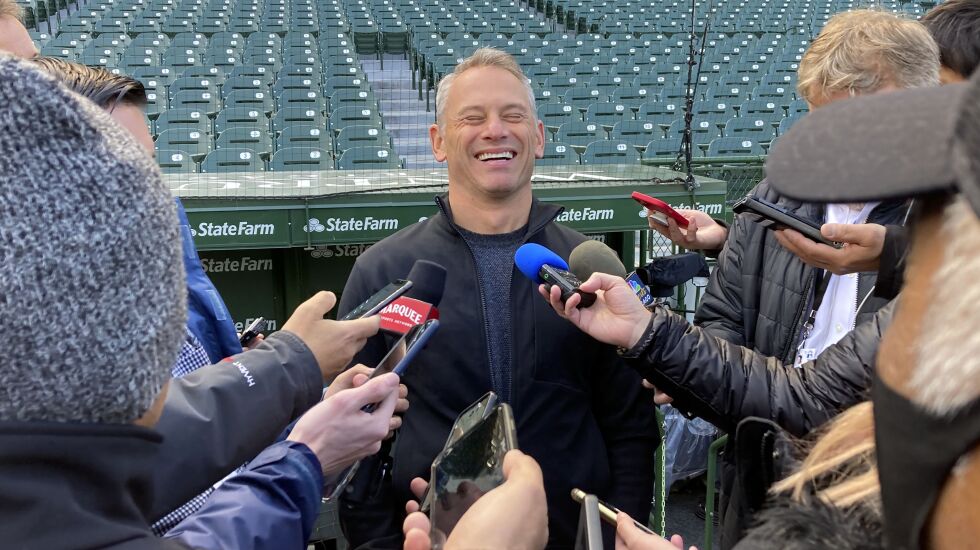
For Cubs president of baseball operations Jed Hoyer, major-league debuts are ‘‘the most enjoyable days at the ballpark.’’ And he witnessed two of the best he has seen this week, as utility player Christopher Morel homered in his first at-bat and pitcher Brandon Hughes struck out five in 1 ⅔ innings.
‘‘It’s not even so much the debut,’’ Hoyer said, ‘‘but seeing them in the clubhouse before the game. They put on the uniform, realizing that they get to do this, and you’re finding out their parents are flying in and all those different things. It’s really gratifying for us.’’
At this point in the Cubs’ team-building cycle, Hoyer is going to have plenty of opportunities to soak up that feeling.
The Cubs might not want to call this process a rebuild, but trading away most of the last championship core last summer while keeping ‘‘one eye on the present and one eye on the future’’ is a retooling, at best. Regardless of the label, the Cubs need their farm system to produce to pry open that next championship window.
‘‘I’m really proud of the way the minor leagues are playing,’’ Hoyer said of the Cubs’ farm system, which Thursday featured two first-place teams. ‘‘You look at our record and our performance at every level, it’s been really strong. You can never have enough depth, and it never gets to a point of feeling like your system is good enough. But I feel like we’re on the right track.’’
Trades in the last couple of years have strengthened the lower levels, especially, as the Cubs brought in young talent. But Hoyer acknowledged those trades won’t be fully evaluated for another five or so years.
‘‘I think that’s probably the way it should be,’’ he said. ‘‘I don’t think anyone should be looking at it as a passing grade at this point. They should be looking at, ‘Well, what does that net down the road?’ ’’
How did the players the Cubs acquired — whether they remained in the organization or were traded again down the line — fit into their larger plan? Were the Cubs able to achieve the sustained success the front office promised? And how long did it take for them to get there?
‘‘I don’t wanna put exact years on it, like you want me to,’’ Hoyer said. ‘‘I think it’s hard because we did trade for a lot of guys that were in the lower levels. . . . I don’t think you can tie a team’s competitiveness to a group of guys who are in the low minors. So, certainly, I think a lot of those guys are going to play a big role here. But I don’t want to just think about their timeline as being our timeline.’’
As Morel’s and Hughes’ debuts showed, the Cubs also have minor-leaguers waiting in the wings for their shot at the big leagues.
No. 1 prospect Brennen Davis, who is on the minor-league injured list with discomfort in his lower back, is rehabbing in Arizona and ‘‘will be working his way back over the next few weeks,’’ vice president of player development Jared Banner said.
Davis raced up the ranks from High-A South Bend to Double-A Tennessee to Triple-A Iowa last season, but he has had a slow start at Iowa this season, batting .195.
‘‘Certainly not what anyone expected, given the work in the winter and what he did in Iowa last year,’’ Hoyer said. ‘‘But that’s baseball. And I have no doubt that he’s going to come back stronger from this [injury].’’
Iowa right-hander Caleb Kilian, whom the Cubs got from the Giants in the Kris Bryant trade last summer, might be even closer to the majors.
‘‘He’s been getting better and better with each start,’’ Hoyer said. ‘‘And we’re really excited about him. I can’t speak to timetables, but we’re well aware of the success he’s having.’’
The Cubs will have to put Kilian on the 40-man roster by the end of the year to protect him from the Rule 5 Draft. But might he be an option at the end of this month, when the Cubs have two doubleheaders in the span of a week?
‘‘I wouldn’t speculate on that,’’ Hoyer said.
Next up on the Cubs’ calendar is the trade deadline at the end of July. Hoyer said he’s always in communication with general managers around the majors, just to check in or because they’re friends.
‘‘People are getting a sense of what they might need or what they might do,’’ Hoyer said. ‘‘But as far as specific needs, no one’s doing that right now.’’







